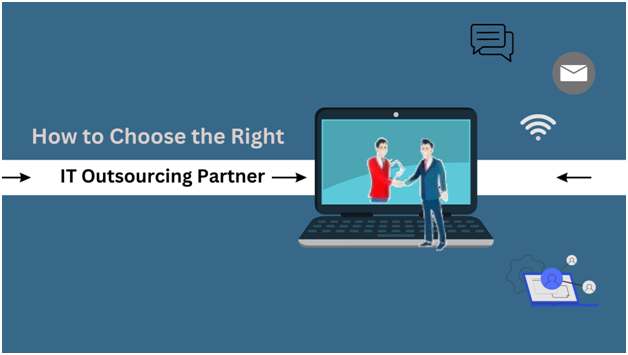How to Choose the Right IT Outsourcing Partner: A Comprehensive Guide
Contents
- How to Choose the Right IT Outsourcing Partner- A Comprehensive Guide
How to Choose the Right IT Outsourcing Partner- A Comprehensive Guide

In today’s fast-paced business world, outsourcing IT services is a smart strategy for companies of all sizes. With the global outsourcing markets growing rapidly, more businesses see the value of outsourcing their IT needs. By doing so, companies can focus on what they do best while relying on experts for IT solutions. This leads to faster growth, more innovation, and cost savings. This also helps them avoid the expense of building an in-house IT team.
However, the real challenge is finding the right outsourcing partner. With so many options, choosing a company that offers high-quality IT services at competitive prices is crucial. This article will help you make the right decision.
How to Choose Your Ideal IT Outsourcing Company

Selecting the right IT outsourcing company is crucial for your business’s success. A well-chosen partner can streamline operations, boost innovation, and save costs. When looking for an IT outsourcing company, keep the following points in mind.
1. Define Your Outsourcing Requirements and Goals
Before starting your search for an outsourcing partner, it is essential to clearly define your goals and requirements. Identify the specific tasks or projects you want to outsource and the desired outcomes.
Consider the following –
- Are you focused on reducing costs and increasing efficiency?
- Do you need access to specialized skills or aim to scale your operations?
Having clear objectives allows you to communicate your expectations efficiently to potential partners. It will also give you the assurance that they can meet your needs and align with your business goals.
2. Perform In-Depth Market Research
Thorough market research is crucial to finding the ideal outsourcing partner. Use various resources to gather detailed information about potential firms. Look for reviews and ratings on platforms that provide insights from previous clients. These reviews will help you shortlist partners based on their expertise, reliability, and ability to meet deadlines and stay within budget.
Examine case studies and client testimonials to understand the company’s capabilities better. This will give you a clearer understanding of how they have handled similar challenges and their ability to deliver quality results. Comprehensive research will ensure you choose a partner that aligns with your business needs.
3. Assess the Capacity of the Potential Outsourcing Partner
Evaluating a potential partner’s capacity is essential. Ensure they have the necessary resources, including a skilled team and the right technology and infrastructure for your project. Inquire about the size of their team and the expertise of their staff. Choose a partner to adjust their resources based on your project’s needs. This flexibility is crucial for handling changes and scaling efficiently. Ensure the partner can meet your demands efficiently and support your project’s success.
4. Focus on the Expertise of the Experts
When selecting an outsourcing partner, make technical expertise a top priority. Look for partners who can demonstrate their competence in several of the below listed areas –
- Relevant Experience- Review their case studies to understand their experience with projects similar to yours. This gives you insight into their ability to handle your needs efficiently.
- Technical Knowledge- They should have a deep understanding of the technologies required for your project. This includes familiarity with the right programming languages, frameworks, and tools essential for success.
- Team Skills- Evaluate the skills of their team members. Confirm they possess the necessary expertise and experience to deliver high-quality work consistently.
- Modern Technology- Your partner should use up-to-date technology and stay current with industry trends. This guarantees your project benefits from the latest advancements and efficient solutions.
- Problem-Solving Abilities- Look for a partner with a proven ability to address complex problems. Their track record in overcoming challenges demonstrates their reliability and problem-solving skills.
- Dedication Towards the Project – Choose a partner with genuine interest and enthusiasm for your project. A passionate partner is more likely to drive innovation and deliver exceptional results.
5. Evaluate the Data and Intellectual Property Security Measures
Protecting your data and intellectual property is crucial. Verify that your outsourcing partner has strong security measures to safeguard your sensitive information. This includes compliance with relevant regulations and secure data storage. Check their access control policies and procedures for data protection. Ensure these measures align with your security requirements to ensure your information remains safe and protected.
6. Understand Costs and Define Your Budget
When evaluating outsourcing partners, compare their pricing models to ensure they fit your budget. Look at the total cost of ownership, including any hidden fees and long-term expenses. Consider flexible pricing options like fixed-price contracts or milestone-based payments. These can help with financial planning and adapt to your growing service needs. Ensure the cost aligns with your budget and provides good value for the services offered.
7. Evaluate Post-Development Support and Maintenance
Ensure your outsourcing partner offers ongoing support and maintenance after completing the project. This should include regular updates, troubleshooting, and prompt resolution of any issues to keep your systems running smoothly. Confirm their support availability, such as 24/7 assistance, to handle any urgent problems that may arise. Reliable post-development support ensures your systems remain functional and up-to-date, minimizing disruptions to your business.
8. Assess Scalability and Flexibility
Finally, assess the partner’s ability to scale their services and adapt to your changing needs. Many businesses overlook this aspect, which can limit future growth. Make sure the partner can accommodate increasing demands or sudden workload spikes. Check their capability to adjust to changes in project scope, timelines, or priorities. A flexible and scalable partner can seamlessly adapt to your evolving business requirements.
Tips to Make IT Outsourcing Partnership Successful
 Choosing the right outsourcing partner is just the beginning. Follow these best practices to make your partnership successful –
Choosing the right outsourcing partner is just the beginning. Follow these best practices to make your partnership successful –
1. Set Clear Expectations
Clear expectations are essential for a smooth outsourcing relationship. Unrealistic expectations can lead to delays and conflicts. Both parties must agree on the project’s objectives, scope, and outcomes.
- Goal Alignment- Regularly review these metrics to monitor progress and make any necessary adjustments. Make sure your partner understands your business goals. Explain how their work fits into these objectives. Aligning goals helps make decisions about tasks and priorities.
- Detailed Contracts- Create contracts that clearly define the work to be done. Include timelines, quality standards, and payment terms. Use this document as a reference throughout the project to avoid misunderstandings.
- Onboarding Process- Teach the outsourcing team about your company’s processes, culture, and expectations. This initial effort helps reduce errors and ensures smoother integration.
- Performance Metrics- Establish clear metrics and KPIs to measure success. Regularly review these metrics to monitor progress and make any necessary adjustments.
2. Manage Performance Efficiently
Efficient performance management is crucial for achieving the desired results from your outsourcing partner. Without proper management, maintaining high standards can be challenging.
- Regular Assessments- Conduct frequent assessments of the partner’s work. This helps you evaluate quality and adherence to deadlines. Use these assessments to provide feedback and recognize achievements.
- Benchmarking- Compare your partner’s performance with industry standards. Benchmarking highlights areas for improvement and fosters a culture of continuous enhancement.
- Incentives and Penalties- Create a system of incentives for excellent performance and penalties for poor results. This will motivate the partner to maintain high standards and deliver quality work.
- Issue Resolution- Develop a clear process for addressing issues and conflicts. Timely resolution prevents problems from escalating and affecting the project’s progress.
3. Be Flexible and Adaptable
The business environment is always changing, and your outsourcing projects must be flexible and adaptable. Being adaptable helps you manage changes and challenges efficiently.
- Change Management- Implement a change management process. Carefully handle any changes in scope, timelines, or requirements. Ensure all changes are documented and approved by stakeholders.
- Resource Scaling- Ensure your outsourcing partner can adjust resources as needed. This helps manage workload fluctuations and meet project demands efficiently.
- Agile Methods- Adopt agile methodologies for development. These practices allow your team to respond quickly to changes and deliver incremental value.
4. Implement Risk Mitigation Strategies
Outsourcing involves inherent risks, including data security and project growth challenges. Implementing robust risk strategies helps protect your business interests.
- Due Diligence- Perform thorough due diligence before selecting an outsourcing partner. Assess their financial stability, track record, technical capabilities, and references.
- Legal Protections- Ensure your contract includes legal protections such as non-disclosure agreements and clauses for intellectual property rights and termination. These provisions help shield your business from potential legal issues.
- Data Security- Enforce strict data security measures. Protect sensitive information using encryption, secure access controls, and regular security audits.
- Regular Audits- Conduct regular audits to ensure compliance with contract terms and security standards. Audits help identify potential risks early and prompt necessary corrective actions.
- Business Growth Planning- Develop a plan to address potential disruptions related to business growth. This will enable you to concentrate on reaching your business objectives.
Conclusion
Managing a business is demanding, with countless roles and opportunities to chase. But imagine if you could focus solely on your core strengths. That’s the advantage of outsourcing. By selecting the right partner, you gain access to specialized expertise and support. Think of it as having a dedicated team that brings fresh ideas and skills to the tasks you delegate. You can achieve your business goals better while focusing on growth. You are not merely offloading tasks but also creating a strategic partnership that drives innovation and efficiency. If in this journey, you are looking for an excellent outsourcing partner, consider Axtrics Australia. For the best services and unparalleled guidance, consult with our experts today!
